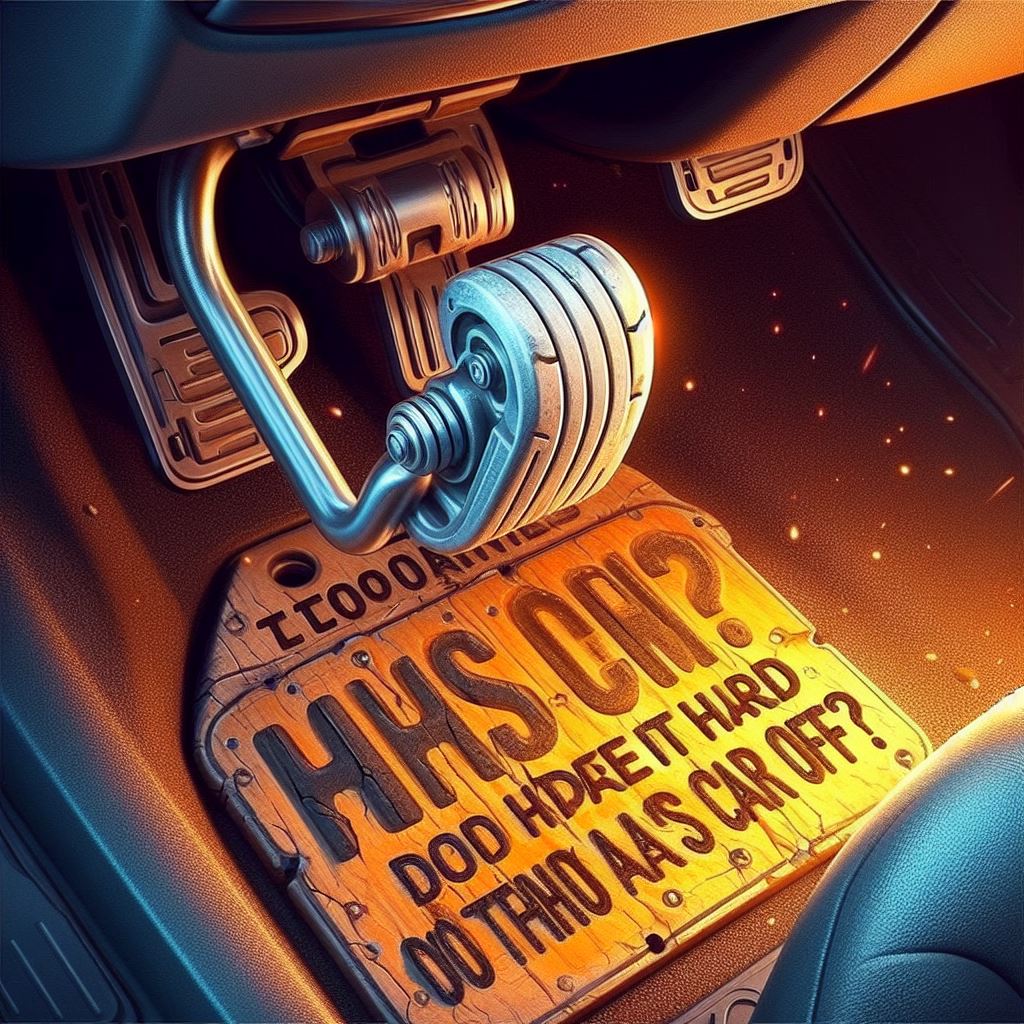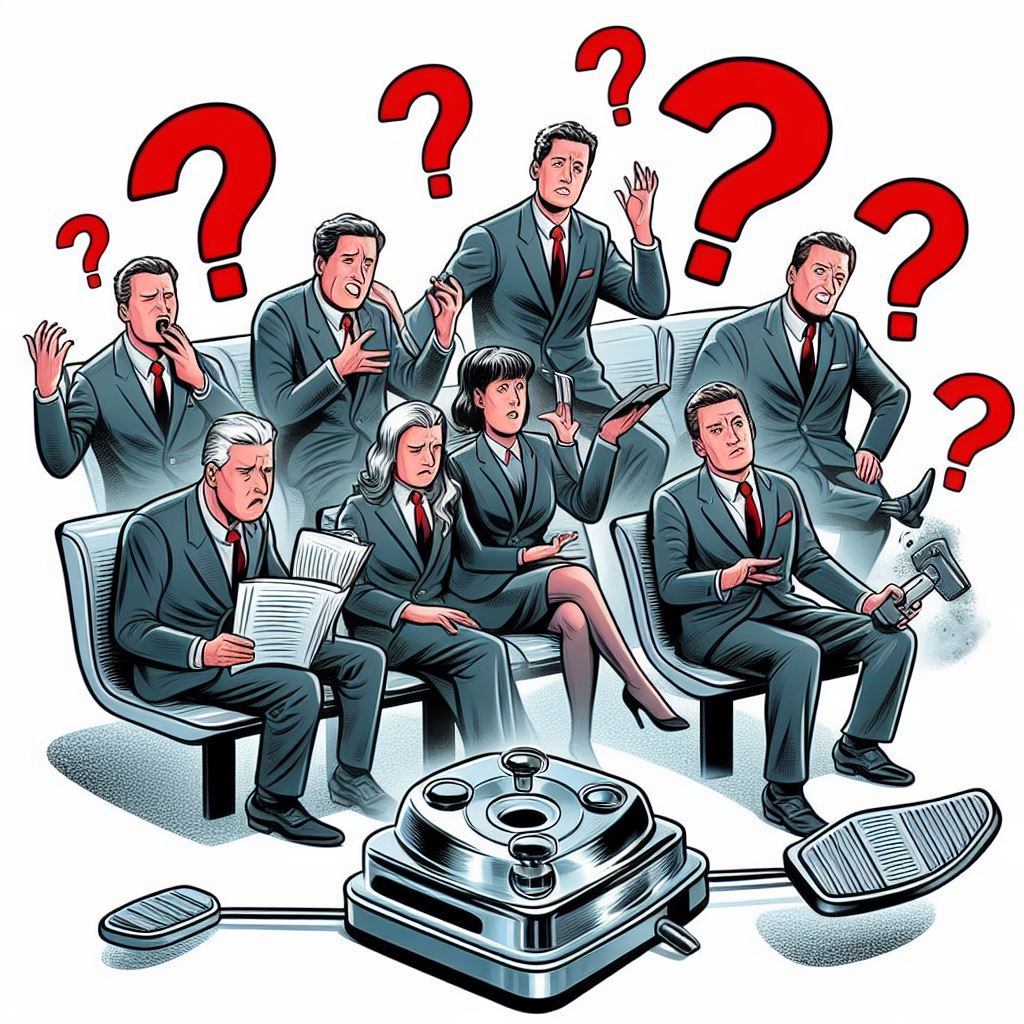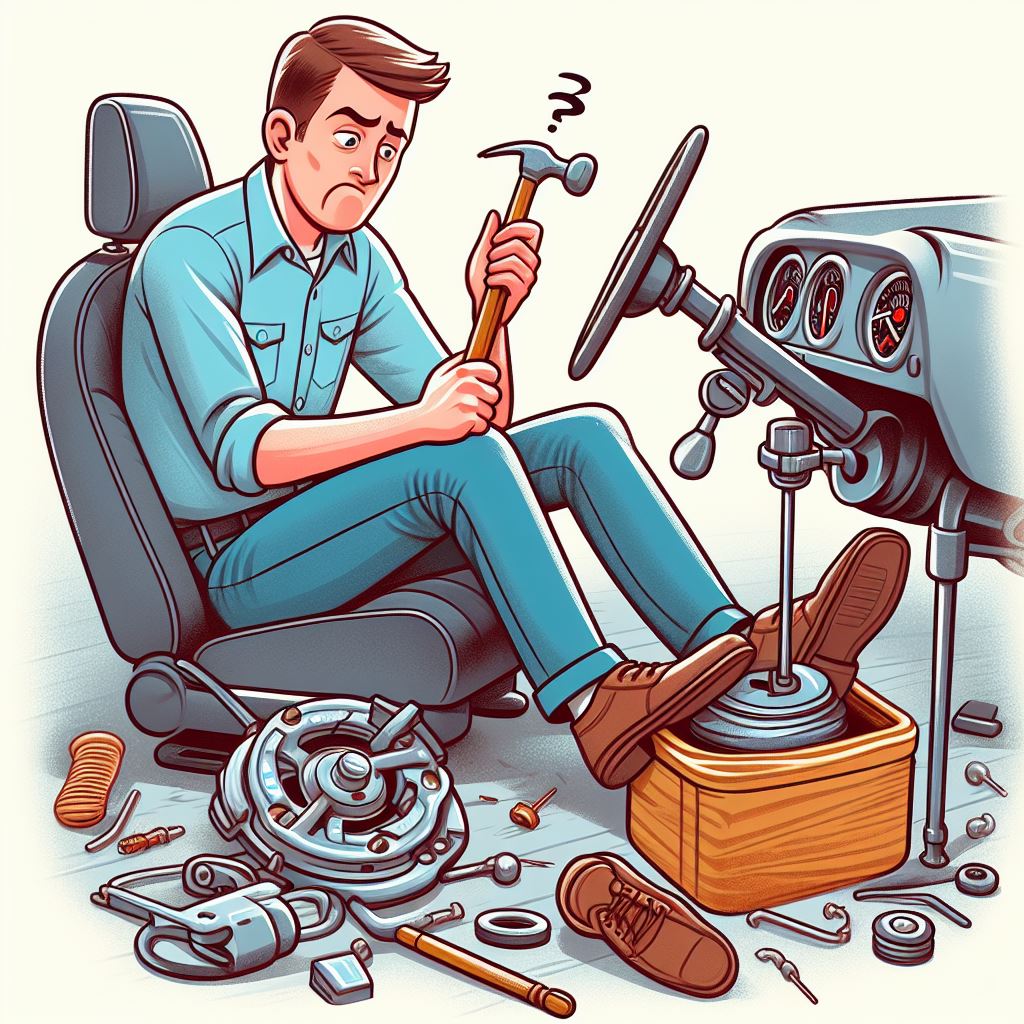Why Does The Brake Pedal Get Hard When The Car Is Off?
Braking systems are a critical part of any vehicle, ensuring your safety while driving. But have you ever wondered, “Why does the brake pedal get hard when the car is off?” This might seem like a minor detail, but understanding it can give you a deeper insight into how your car functions.
In this article, we will delve into the mechanics behind this phenomenon. We’ll explore how the braking system works, why the brake pedal becomes hard when the car is turned off, and whether this is something you should be concerned about. So buckle up and get ready for an exciting journey into the workings of your vehicle.
Table of Contents
How Do Brakes Work?
Understanding the mechanics of a car’s braking system can be fascinating. Have you ever wondered, “Why does the brake pedal get hard when the car is off?” This is due to the absence of vacuum assistance. When your car is running, the engine creates a vacuum that powers the brake booster, resulting in a softer, more responsive brake pedal. When the car is off, the engine stops producing this vacuum. Consequently, the brake booster doesn’t get the necessary power to function, making the brake pedal feel harder. It’s a direct example of just how interconnected the various systems within your vehicle are. Understanding these nuances is not only interesting but can also help in identifying potential issues with your vehicle’s performance.

Can You Still Use Your Brakes When the Car is Off?
In this article, we will discuss whether you can still use your brakes when the car is off. There is a common question: Can we still use the brakes while the car is off? The answer is yes! If you want to avoid accidents, you should know how to use your foot and hand brakes. You may think you cannot use your brakes because the car is off. But since they are both connected to the same system, they work as soon as you step on them.
3 reasons why your brake pedal is stiff and the car won’t start
There are several reasons why your brake pedal may be stiff, and your car won’t start. Firstly, a common issue is a problem with the brake booster. If the brake booster is failing or has a leak, it can cause the brake pedal to become stiff and make it difficult to start the car. Secondly, low brake fluid levels can also cause the brake pedal to feel stiff. If the brake fluid is low or contaminated, it can prevent the brake system from functioning properly, leading to a stiff pedal and difficulty starting the car. Lastly, a faulty brake light switch can also be the culprit. If the brake light switch is not functioning correctly, it can prevent the car from starting and cause the brake pedal to feel stiff. It’s important to have these issues diagnosed and repaired by a professional mechanic to ensure the safety and proper functioning of your vehicle.
Why is my brake pedal hard?
- Your brake pedal is hard because you use your foot to apply the brake instead of using your foot to depress it.
- There are many possible causes for a hard brake pedal, including vacuum leaks in the booster.
- ABS systems may be to blame.
- Brakes work by slowing or stopping a car.
- The brake pedal presses down on its shaft when you brake, making the brakes squeal.
- The squealing is caused by metal-on-metal contact.
- To stop quickly, you need to apply as much pressure to the brake pedal as possible.
- If your brakes are squeaking, it may be time for a replacement part or adjustment.

Troubleshoot a Hard Brake Pedal
- You may have trouble pushing it because one of the components in the braking system is malfunctioning.
- A thorough inspection of the whole system can help identify any underlying issue.
- Contact a professional mechanic for advice if you are uncertain about what to do.
- If you experience a hard brake pedal, the most likely cause is a defective or worn brake pad.
- If your car has ABS (anti-lock braking system), the brakes may be activated unexpectedly if the fluid level falls below a certain point.
- If you have recently replaced your pads or shoes, flush them with fresh brake fluid and check for leaks afterward.
- Many different things can cause a hard brake pedal, and it’s important to troubleshoot the problem before replacing anything.
- The pedal can be tested to determine which part is causing the problem.
- If nothing seems to work, it might be time for a new brake pedal or brake system altogether.
Hard Brake Pedal Intermittent – Causes and solutions
Some issues can lead to a hard brake pedal, including a faulty pressure differential valve. The valve must be moved to the center to correct the issue, and the pressure on both sides of it must be equalized. If your vehicle has OEM brakes, there is a chance that the same valve could be responsible for causing the problem.
Vacuum Pressure
- A lack of vacuum pressure causes the hard brake pedal.
- If the vacuum pressure is low, an electric pump or canister may need to be installed.
- The size of the booster must be appropriate for the car’s engine and driving conditions.
- This should be checked before installation.
Valving Issues
- Combination valves, pressure differential valves, and brake fluid can cause a hard brake pedal.
- The problem must be corrected to fix the hard brake pedal.
- Properly operating brakes are essential for safety.
- You can get into serious trouble if your brakes don’t operate properly.
- As a result, it is essential to know what problems your brakes may cause and what you can do about them.
- For example, a faulty master cylinder often causes a hard brake pedal.
- When the piston moves up and down inside the master cylinder, it creates a vacuum effect.
- As the vacuum increases, force is applied to it.
- If the master cylinder leaks, brake fluid will leak through the seals.
- If the seal fails, brake fluid will escape into the surrounding area.

Pedal Ratio
- According to the pedal ratio, the pivot points of the brake pedal are proportional to its length.
- A mismatch of just 1/4″ can prevent enough pushrod from passing through to the booster, preventing it from moving the piston into the master cylinder.
- It is sometimes difficult to move the pedal pivot to correct the pedal ratio.
- Several factors other than pedal ratio can cause hard brake pedals.
- If changes have been made, this is an area worth investigating.
- Use the tips above or consult a professional mechanic.
Something Else
- A hard brake pedal is often associated with a power booster, master cylinder, or pivot point ratio of the brake pedal.
- By examining and troubleshooting the most likely scenarios and problem spots, you can likely spot the cause of the hard brake pedal.
- Consult with a mechanic if you are not sure what to do.
- Hard brake pedal intermittent is a symptom of a car’s braking system problem.
- There are several possible causes of hard brake pedals intermittent, including worn or defective brakes, corroded brake lines, and bad fluid levels.
- If you experience a hard brake pedal intermittently, you must take your car in for inspection as soon as possible.
Your brake fluid needs replacing.
- Keeping brake fluid in good condition is essential, as it degrades and becomes a dark brown liquid over time.
- If brake fluid gets thick or dark, it may not work properly and will put resistance in the braking system.
- Brake pads wear down over time, leading to braking problems, including grinding sounds and a stiff pedal feel.
Your brake pads have worn down
- Brake pads need to be replaced periodically due to wear
- Brake fluid darkens and thickens over time, becoming less effective if it reaches this stage
- Braking may become harder when brake fluid is in this state
- How to release brake pressure when the car is off
- Check the brake fluid level and lines for leakage to diagnose the fault.
- If there is a leak, oil residue may be seen on the wheel.
- Also, check the brake master cylinder to see if the seals are worn and suspected fluid leaks.
What Causes the Brake Pedal to Get Hard When The Car Is Off?
There are a few potential causes for the brake pedal getting hard when the car is off. One potential cause is that the brake fluid has become contaminated. This can happen if the fluid level gets low or if the fluid is contaminated by dirt or other debris. It is possible that contaminated brake fluid can cause a hard pedal because it can prevent the brakes from working properly. Another potential cause is that the brake pads have become worn down.
If the pads are worn down, they can no longer grip the rotors effectively. This can cause the brake pedal to get hard when the car is off because the pedals will not push down. Additionally, it may be that the brake master cylinder is leaking, resulting in a soft brake pedal when the car is off and then a hard pedal when the car is started.
Frequently Asked Questions [FAQs]
1. How Can You Prevent This Condition?
When you drive your car, the brake pedal gets hard because the car is off the ground. It gets hard when the car is off the ground because it is not using its engine to move. The car uses its engine to move when you are driving.
2. What Should You Do If The Brake Pedal Gets Hard?
If it gets hard when the car is off, there could be some potential causes. The most common problem is dried-up brake fluid after the vehicle has sat for long periods. If the pedal gets hard even when the car is in the park, there could be a problem with the brake system. A new brake system may be necessary in this case.
3. How to Test Your Brake Pedal to See If It Works
A brake pedal is a mechanical device that stops the motion of a vehicle. It’s typically attached to the brake system, interconnected hydraulic and mechanical devices that slow or stop the car. To test your pedal, you should push down on it with your foot and then pull up on it with your hand. If you can’t feel anything, your brakes are not working properly. If you can feel something when you push down on the pedal but not when you pull up on it, then there’s an issue with one of your brakes or an issue with the pedal itself.
4. Why is it bad to pump the brakes when the car isn’t moving?
It is bad to pump your brakes when the car is off. When the engine is running, it is bad to pump your brakes. If a brake line leaks, you may need to check the brake fluid level and replace the brake master cylinder. You should not install a brand-new or rebuilt brake cylinder when your brake system needs to be repaired or replaced.
5. Does the brake pedal work when the car is off?
The brake pedal works when the car is off if there is no leakage in the brake system; this includes checking the brake fluid level. The brake master cylinder should be replaced if it leaks and the brakes do not work well.
Conclusion
The brake pedal can get hard when the car is off for a variety of reasons. The most common cause is contaminated brake fluid or worn down brake pads. Additionally, it may be that the brake master cylinder is leaking, resulting in a soft pedal when the car is off and then a hard pedal when the car is started.
To prevent this condition from occurring, it’s important to regularly check the brake fluid level and replace any worn-down brake pads. If the pedal gets hard even when the car is in the park, it’s important to have a professional inspect your brake system for any issues.
